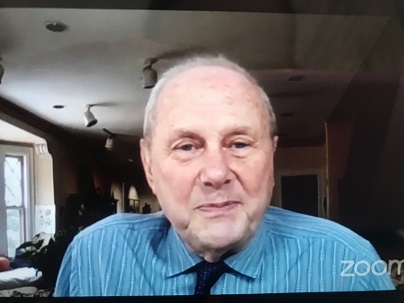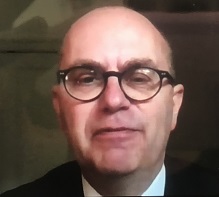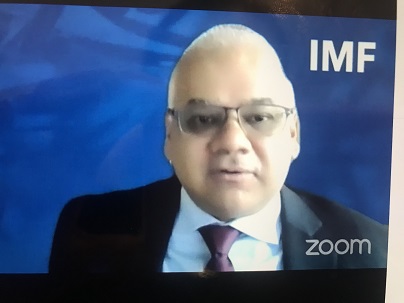International Monetary Fund Experts Discuss Financial Future for Central Asia
By Elaine Pasquini

Washington: On May 25, the Central Asia-Caucasus Institute hosted a virtual discussion on the economic outlook for Central Asia and the Caucasus featuring Subir Lall, deputy director of the IMF in charge of Central Asia and the Middle East; and Ron Van Rooden, IMF mission chief of Uzbekistan, the Middle East and Central Asia.
 |
 |
 |
Dr. S. Frederick Starr |
Ron Van Rooden |
Subir Lall |
Dr S. Frederick Starr, chairman of the Central Asia-Caucasus Institute at the American Foreign Policy Council, noted the region is suffering from inflation – part of an overall world economic slump – along with a variety of mercantilistic trade policies, the Ukraine war, sanctions on Russia and the Taliban rulers in neighboring Afghanistan. These factors and many others affect the International Monetary Fund’s economic outlook for the region.
Lall pointed out the IMF’s current assessment is evolving as the state of affairs in Central Asia is still in flux as the region recovers from the two-year pandemic and Russia’s continuing military campaign in Ukraine.
Despite these problems, “GDP growth was actually better than had been forecast by our group,” Lall said. “The economy was stronger even with the pandemic driven by stronger than expected domestic demand from households and firms in these countries.”
One result from the rebound in activity in the region, however, was an inflation surge from 6.6 percent in 2019 to 9.2 percent in 2021, he related. In response, the Central Banks generally tightened the monetary policy even before the war in Ukraine.
Debt generally increased for all countries in the region mainly due to support for the pandemic and for alleviating the impact on the population over the past two years, Lall reported. The Ukraine war and resulting sanctions on Russia caused an immediate spike in commodity prices adding to existing inflation pressures. At the beginning of the war oil prices and gas prices skyrocketed and still remain volatile although they have receded somewhat.
The initial shock of the war also contributed to the depreciation of currencies, which elicited interest rate hikes in some of the countries in the region, including Kazakhstan, and foreign exchange intervention in Georgia, Kazakhstan, Kyrgyzstan and Uzbekistan, Lall said.
Focusing on exports, Lall noted Russia is a sizeable export destination for many Central Asian countries, such as Armenia and Turkmenistan. Remittances are also important particularly for Kyrgyzstan, Tajikistan, Uzbekistan and Armenia.
The IMF has reduced its estimated growth for this year from 4.1 percent for the region as a whole down to only 2.6 percent, he said. And inflation has been revised upward for all countries and is expected to remain higher for longer reflecting the global increase in food and energy prices since February.
“For the region as a whole we now expect inflation to actually be about 11 percent on average for the region as a whole,” Lall said. “The current account deficits in the region are expected to widen because of higher commodity prices and lower remittances in the region, although the oil exporters and commodity exporters will benefit.”
Prior to the pandemic, Van Rooden worked in Uzbekistan where he witnessed the country of 34 million transforming into a merging market economy. “The country had a strong Central Bank and Ministry of Finance, sizable support from the international community and a dedicated government to keep sound economic policies in place,” he said.
Corruption, however, was one of several challenges, Van Rooden noted. “It was always difficult to push things ahead because of push-back from vested interests, but gradually things were clearly improving.”
With support from the international community and strong economic fundamentals, Uzbekistan weathered the last two years of the pandemic rather well, he said. A rebound in remittances in Uzbekistan accelerated from two percent in 2020 to more than seven percent last year, while inflation fell to 10 percent by the end of last year owing to a very tight monetary policy stance by the Central Bank, he added.
But just as it appeared that Uzbekistan had moved past the acute phase of the pandemic, “the war in Ukraine and sanctions on Russia have brought new uncertainty and weigh heavily on the outlook,” Van Rooden said. Remittances – close to ten percent of GDP last year of which almost three-quarters originated from Russia – are now in jeopardy.
Russia is a key trading partner and also accounts for almost 20 percent of imports, mainly vegetable oil, sugar and fuel. In the past, 12 percent of Uzbekistan’s exports – mainly fruit, vegetables and textiles – went to Russia.
The goal of Uzbek authorities is for the country to have an upper middle-income economy by 2030 and to slash poverty by one-half, Van Rooden explained.
To achieve this goal, the private sector needs to be strengthened to help prevent Uzbek workers from looking for work abroad, primarily Russia, he pointed out. In addition, advantages for state-owned enterprises need to be eliminated. There is also a need to strengthen property rights and rule of law by improving the judiciary and accelerating the sale of non-agricultural land and establishing a market for agricultural lands, he added.
“There is still a long road ahead which is not made easier by the current headlines coming from the war in Ukraine and the sanctions on Russia,” Van Rooden stated.
In conclusion, Starr pointed out there is evidence of greater interaction between the leading economies, particularly pointing to Uzbekistan, Kazakhstan and Azerbaijan. “They are definitely interacting more than they were a year or two ago,” he said. “There is also evidence of change in the other economies that we have not focused on, such as Kyrgyzstan. This all bears watching. It is not a static condition. This story is not over.”
(Elaine Pasquini is a freelance journalist. Her reports appear in the Washington Report on Middle East Affairs and Nuze.Ink.)

